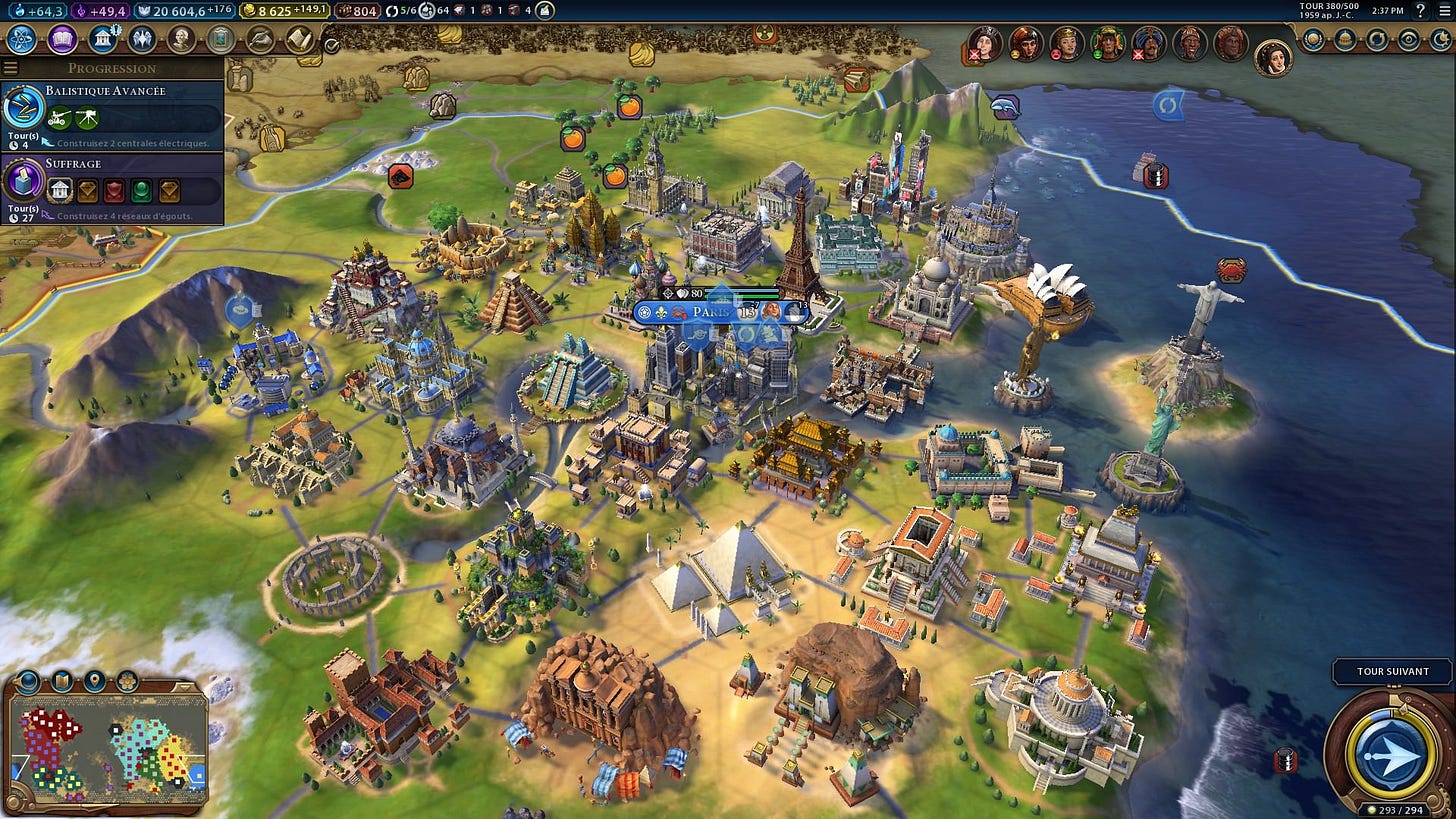[This post is part of a larger strategy guide for Civilization 6]
Culture wins are probably the second most common win condition, after science. They aren't quite as easy to stumble into (though it can happen), but so much of the game relies on culture and the civics tree that it's comparably very easy to "spec" into a culture-heavy end game.
But culture wins also mostly happen when the game is a sweep — one person is dominating everyone else so thoroughly that they go for the fastest win condition available, and that just happened to be culture. Put a slightly different way, I haven't been in a ton of close games where someone wins on culture. Science wins always seem to come down to the wire, with multiple people trying to eke out the production to get one extra light-year ahead. Culture, by contrast, generally only has one person in the lead, and that too in a pretty dominant position.
A huge reason for this outcome distribution is how culture mechanics actually play out. Winning foreign tourism means everyone else has less domestic tourism. So either everyone is around the same equilibrium point and no one wins (with culture) or one person pulls ahead in a snowball that keeps rolling through.
When to choose culture
The best time to go for culture is when you're the only one going for culture. If you're in a game without any other strong culture-oriented civs, you should aim for a culture victory from the get-go. A huge part of winning culture involves winning races — races for wonders, races for great people, races to the relevant techs and cards. If you are the only one in the game who's prioritizing culture and tourism, you're more likely to win those races! This naturally means that you should do everything in your power to either encourage other folks not to go the culture route, or to cripple other culture civs as early as possible.
Civs that do well on culture victories are those that have natural boosts for generating culture (Greece, Khmer, Russia), tourism (China, Sweden, France, Canada, America), or both (Maori). Many of these civs have adjacent useful abilities, like faith generation (Khmer, Russia) or the ability to avoid/defend against being attacked (Canada, America).
It's a wonderful life
In some sense, everyone knows that building wonders is good and worth doing. But most players won't prioritize every wonder in the game.
If you're going for culture, every wonder is worth getting.
Some simple math: each wonder gives you 5 tourism in BBG. There are 19 wonders in the ancient and classical eras of the game. That's 95 tourism before the medieval era. If you build even a solid chunk of those, you will be swimming in tourism, especially compared to the culture being generated around that time (remember, you don't get theater squares until after political philosophy!)

In an entirely human game, many wonders will be up for grabs for far longer than if you were playing against AI. And your ability to out race others for wonders is much stronger.
The flip side: wonders are expensive. They cost a lot of production that could be going to ramp infrastructure. Many of the ancient era wonders are somewhere between 180 and 220 production in a standard game. The classical era wonders are around 400 production. A healthy city in the mid classical era might have 20-30 production per turn, so building an ancient wonder might take ~6-10 turns while a classical era wonder may take 13-20 turns.
The massive investment is daunting, but it's also why most of the wonders will stay open. Pyramids, Etemenanki, Oracle, Hanging Gardens — these are fantastic early game wonders with broad utility regardless of the civ you're playing. In human games, there will be competition for these. But Stonehenge, Great Library, Great Bath — I almost never see human players going out of their way to build these wonders. That's 15 tourism right there!
Wonders are definitely expensive, but there are a few ways to reduce the costs. First, you're going to want to use the Autocracy government and the Corvée card. Together this gives you a 25% discount on building wonders. So now ancient era wonders should take around 4-7 turns instead of 6-10, while classical era wonders should take around 10-15 turns instead of 13-20. That's a sizeable improvement!
You can add another 20% discount with Monument to the Gods, though as always with pantheons you should take a look at what's around and decide based on that. If you have a ton of nearby marsh tiles, for example, Lady of the Reeds and Marshes may be better than Monument.
And finally, you should plan ahead and aggressively snipe wonders that you know will be helpful or will have competition, eg. by putting early investment in adjacencies that you know you'll need. Even though I'm playing pangea, I'll often build a harbor just to try and pick up Colossus, Great Lighthouse, and Mausoleum.
First slowly, then all at once
You start the game with basically no tourism. You need to end the game with more tourism than everyone else has culture. This is, bluntly, rather difficult. But the game helps you along by giving you multipliers.
The flight tech makes all of your culture tiles output tourism.
The computers tech increases your tourism by 50%.
The environmentalism civic increases your tourism by another 50%.
Moksha can double the tourism for all great works in a city. And other cards can double or triple the tourism output for great works of art or music.
As you get more great works you can begin theming museums, which triples the tourism output.
Open borders and trade routes start with a flat 25% tourism increase to destination civs, and the latter can increase over time with Modern Era Great Merchant abilities.
We already spoke about Rock Bands and their exponential tourism scaling earlier in the guide.
The important thing about all of these multipliers is that they (mostly) all come near the end of the game. Even the ability to create national parks does not show up until the modern era.
This means that there are massive tourism spikes in the end game. You won't be anywhere close to victory all through the atomic era, and then suddenly you're there. It also means there are targeted cards and techs that you should go out of your way to rush. I'll often pick up computers before rocketry, for eg; I just want the extra turns of high tourism.
All these multipliers are somewhat useless without a strong base of tourism coming from wonders and great works. By the atomic era you should have at least 100 tourism per turn — generally, that means something like ten wonders and ten great works.
I've already mentioned this earlier in this guide, but to really have a shot at winning culture you need rock bands. These guys really add to the snowball. Once rock bands are live, you can very quickly go from being far behind to "victory in two turns". You just need a bit of a lucky dice roll.
Common mistakes
It's hard to win culture, because there are so many mistakes that you can make, and because it's comparably easy to stop a culture player.
The biggest mistake is playing an imbalanced game — you focus on culture at the expense of everything else. Besides leaving your cities open to attack (as other civs ramp up on science your cities will look more and more tempting), it will also leave you in the lurch if you don't have the faith necessary to buy national parks or rock bands. You need a good mix of yields, maybe more than with any other victory type.
Part of that mix includes investing in a strong military. People mistake culture civs as inherently peaceful, and will try to avoid conquest. This is a massive mistake. Tourism growth is paramount, no one cares if the wonders or great works were made in your cities or not. Every time you take an enemy city with an art museum or a wonder, you get more tourism for yourself AND less tourism and culture for your opponent. It's a triple win. So the natural corollary to this is: if any enemy civilizations have wonders or theater squares or anything else that generates tourism on your borders, you should start planning to take them.

To that point, you should be trying to coordinate timing pushes with the natural power spikes that come from corps and armies. Many culture oriented civs, like France, Sweden, Russia, etc., have unique units that come out around when you should expect to get Nationalism or Mobilization. In general, I suspect that culture oriented players get into wars a bit later than average. That means you'll have a harder time — more cities will have walls, you'll need more siege — but the upside of victory is much higher.1
Stopping Culture: it's called counter-culture for a reason
The easiest way to stop a player angling for a culture victory is to invest in culture generation without investing in tourism. Increasing your culture delays your opponent's victory condition, but you don't really need tourism yourself and so you can out ramp your opponent by putting resources into other things. That means putting down theater squares, running some district projects, and, yes, taking some of your opponent's high-tourism-producing cities. Thinking and playing like you are trying to win culture will, funny enough, stop everyone else from winning culture.
Generally, though, you do need a fair bit of investment to really stop a snowball. So if you're close to losing, it can be helpful to prop up the player with the most culture that isn't winning, either by giving them free resources or helping them in war.
Speaking of war, the second easiest way to stop a culture player is to simply eliminate another civ. It doesn't even have to be the one that's winning on culture. If you can fully get rid of another player, all of their foreign tourists disappear. Just don't target the player with the most domestic tourists and you should be good.
The last thing to note here is that you really, absolutely need to stop Rock Bands from entering your cities. Run the Music Censorship card the moment it's clear that someone is even kind of close on culture. Otherwise you might find yourself on the losing side of a very quick jump in tourism.
Concluding Thoughts
The worst thing about the culture victory path is how obscure it feels. The UX for tourism is just really bizarre. As a result, winning culture feels arbitrary and always seems to take way longer than it should. The game is also really bad about notifying other players about ‘imminent culture victories’ that are actually many turns away. But even though culture victories are hard, there is a ton of value in investing heavily in culture and culture mechanics. In fact, one of the most common ‘beginner’ mistakes is not putting down any Theater Squares because ‘there are no good adjacency bonuses’ for it. Don’t make that mistake. Every game is a culture game.
Now, you don't want to wipe an enemy civ out entirely. That will hurt your tourism generation a fair bit. So it's a bit of a delicate balancing act, but one that can really pay off.





